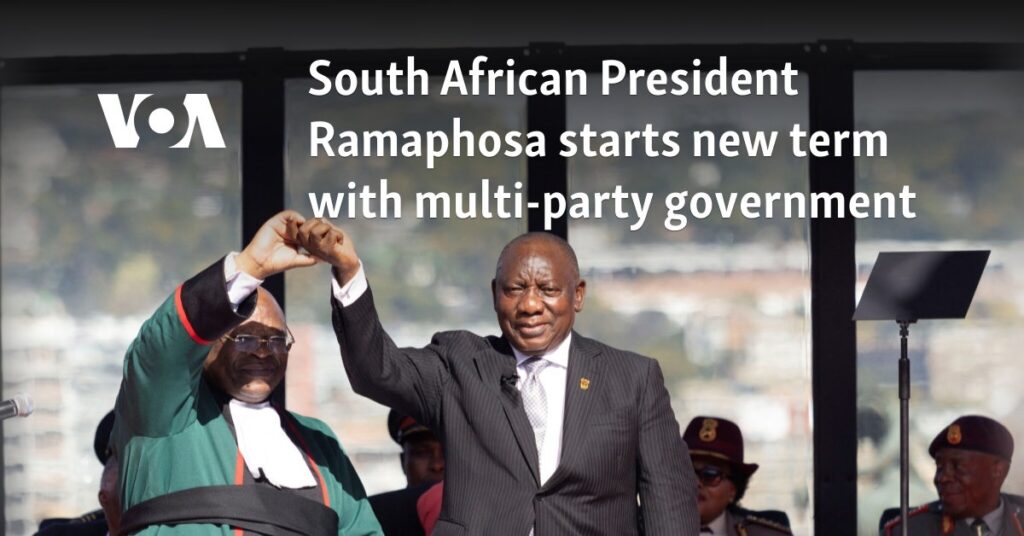Cyril Ramaphosa was inaugurated Wednesday for his second term as South Africa’s president, though analysts said he could face a tough road ahead in keeping his new coalition government together.
Ramaphosa took the oath of office at a colorful ceremony in Pretoria, attended by African royalty, heads of state, and diplomats.
He won a vote in parliament last week to lead the country for a second term.
But the second term begins under starkly different circumstances than the first. Ramaphosa’s African National Congress party lost its parliamentary majority in the May elections for the first time since the end of apartheid thirty years ago.
The ANC then engaged in talks with political opponents to form a coalition government that it is calling a government of national unity. Ramaphosa referenced that in his inaugural speech.
“The voters of South Africa did not give any single party the full mandate to govern our country alone. The formation of a government of national unity is a moment of profound significance. It is the beginning of a new era,” said Ramaphosa.
The ANC struck a deal with the main opposition party, the Democratic Alliance, or DA, which got the second largest number of votes at the polls. Several other smaller parties; the mainly Zulu Inkatha Freedom Party, the GOOD party, and the populist Patriotic Alliance have also joined the government.
The agreement with the centrist DA was a relief to the markets and resulted in gains for South Africa’s currency, the rand.
Lumkile Mondi, a lecturer in economics at Johannesburg’s Witwatersrand University, explains the unity government is seen as “a very positive step.”
“This is happening both in terms of what the markets had expected – that a combination of different parties, led by the combination of the ANC and the DA, would be good for South Africa’s development, ensuring that there is an investor-friendly environment — while at the same time addressing the past inequalities,” Mondi said.
There had been concerns in some quarters the ANC could go into government with the radical left wing Economic Freedom Fighters, which wants the nationalization of land, banks and mines. But the EFF has refused to join a unity government that includes the DA, which has a white leader, John Steenhuisen.
The uMkhonto weSizwe party, or MK, which got the third largest share of the vote and is led by former president Jacob Zuma, has also refused to join a unity government. MK has alleged, without any evidence, that there were election irregularities and refused to work with Ramaphosa, raising the specter of violence.
However, what is notable is how peaceful things have been so far, with the ANC accepting the loss of its majority graciously and forming a coalition, said analyst Melanie Verwoerd.
“Unlike so many other countries in the developing world — when the liberation party or liberation movement turned government and then after a couple of decades lose their overall majority and then won’t accept that — South Africa has gone through a totally peaceful democratic transition …that is incredibly significant,” Verwoerd said.
All eyes are now on whether the unity government deal between such ideologically diverse parties can hold.
“Of course this government of national unity will definitely face challenges …to keep this together will be a challenge,” Verwoerd said.
However she notes Ramaphosa is a seasoned negotiator and believes he is the best man for the job.
He is expected to appoint his Cabinet in coming days.
This article was originally published by a www.voanews.com . Read the Original article here. .


